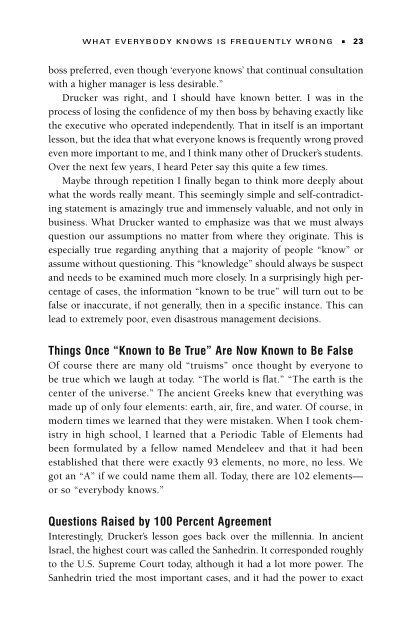A Class with Drucker - Headway | Work on yourself
A Class with Drucker - Headway | Work on yourself
A Class with Drucker - Headway | Work on yourself
Create successful ePaper yourself
Turn your PDF publications into a flip-book with our unique Google optimized e-Paper software.
WHAT EVERYBODY KNOWS IS FREQUENTLY WRONG ■ 23<br />
boss preferred, even though ‘every<strong>on</strong>e knows’ that c<strong>on</strong>tinual c<strong>on</strong>sultati<strong>on</strong><br />
<str<strong>on</strong>g>with</str<strong>on</strong>g> a higher manager is less desirable.”<br />
<str<strong>on</strong>g>Drucker</str<strong>on</strong>g> was right, and I should have known better. I was in the<br />
process of losing the c<strong>on</strong>fidence of my then boss by behaving exactly like<br />
the executive who operated independently. That in itself is an important<br />
less<strong>on</strong>, but the idea that what every<strong>on</strong>e knows is frequently wr<strong>on</strong>g proved<br />
even more important to me, and I think many other of <str<strong>on</strong>g>Drucker</str<strong>on</strong>g>’s students.<br />
Over the next few years, I heard Peter say this quite a few times.<br />
Maybe through repetiti<strong>on</strong> I finally began to think more deeply about<br />
what the words really meant. This seemingly simple and self-c<strong>on</strong>tradicting<br />
statement is amazingly true and immensely valuable, and not <strong>on</strong>ly in<br />
business. What <str<strong>on</strong>g>Drucker</str<strong>on</strong>g> wanted to emphasize was that we must always<br />
questi<strong>on</strong> our assumpti<strong>on</strong>s no matter from where they originate. This is<br />
especially true regarding anything that a majority of people “know” or<br />
assume <str<strong>on</strong>g>with</str<strong>on</strong>g>out questi<strong>on</strong>ing. This “knowledge” should always be suspect<br />
and needs to be examined much more closely. In a surprisingly high percentage<br />
of cases, the informati<strong>on</strong> “known to be true” will turn out to be<br />
false or inaccurate, if not generally, then in a specific instance. This can<br />
lead to extremely poor, even disastrous management decisi<strong>on</strong>s.<br />
Things Once “Known to Be True” Are Now Known to Be False<br />
Of course there are many old “truisms” <strong>on</strong>ce thought by every<strong>on</strong>e to<br />
be true which we laugh at today. “The world is flat.” “The earth is the<br />
center of the universe.” The ancient Greeks knew that everything was<br />
made up of <strong>on</strong>ly four elements: earth, air, fire, and water. Of course, in<br />
modern times we learned that they were mistaken. When I took chemistry<br />
in high school, I learned that a Periodic Table of Elements had<br />
been formulated by a fellow named Mendeleev and that it had been<br />
established that there were exactly 93 elements, no more, no less. We<br />
got an “A” if we could name them all. Today, there are 102 elements—<br />
or so “everybody knows.”<br />
Questi<strong>on</strong>s Raised by 100 Percent Agreement<br />
Interestingly, <str<strong>on</strong>g>Drucker</str<strong>on</strong>g>’s less<strong>on</strong> goes back over the millennia. In ancient<br />
Israel, the highest court was called the Sanhedrin. It corresp<strong>on</strong>ded roughly<br />
to the U.S. Supreme Court today, although it had a lot more power. The<br />
Sanhedrin tried the most important cases, and it had the power to exact


